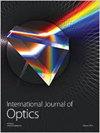Yb2光缔合的选择性控制研究
IF 1.8
4区 物理与天体物理
Q3 OPTICS
引用次数: 0
摘要
从理论上研究了Yb2光缔合的选择性控制。基于从头算理论合理化弗兰克-康登滤波,得到了光缔合的最佳目标态。从X1∑+g到激发态(A1∑u+、B1πu、C1∑u+和D1πu)的相应振动跃迁为v′ = 分别为23、50、55和0。通过使用量子波包动力学方法,我们计算了所选目标状态的收益率和时间评估。初始态的含时波函数在目标振动本征态上的投影反映了Yb2的合成产率。对于目标A1∑u+,我们使用高斯脉冲使v′ = 23在725时高达97% fs。激光脉冲后,正啁啾促进了振动态产率的增加,而负啁啾抑制了其降低。对于D1πu态,当激光强度为1.0时 × 1014 W/cm2,目标态的纯度和产率v′ = 0在1350达到最大值 fs。也就是说,改变激光参数和脉冲形状可以沿着我们想要的方向控制光化学反应。这些条件将为进一步的实验和理论研究提供重要的参考和可行的光缔合方案。目前的研究可能会朝着实现高精度量子操作和材料合成迈出重要一步。本文章由计算机程序翻译,如有差异,请以英文原文为准。
Investigating the Selective Control of Photoassociation of Yb2
The selective control of photoassociation of Yb2 is investigated in theory. Based on ab initio to rationalize Franck–Condon filtering, the optimal target states of photoassociation have been obtained. The corresponding vibrational transitions from X1Σ+g to the excited state (A1Σu+, B1Πu, C1Σu+, and D1Πu) are
v
′
= 23, 50, 55, and 0, respectively. By using quantum wave packet dynamic methods, we calculated the yields with time evaluation for the selected target states. The projections of time-dependent wave functions of initial states on the target vibrational eigenstates reflected the synthetic yields of Yb2. For target A1Σu+, we used Gaussian pulse to make the yield of
v
′
= 23 up to 97% at 725 fs. After a laser pulse, the positive chirp promoted the yield of vibrational states to increase, but the negative chirp inhibited its decrease. For the D1Πu state, when laser intensity is 1.0 × 1014 W/cm2, the purity and yield of target state
v
′
= 0 reached the maximum at 1350 fs. That is to say, changing the laser parameters and pulse shapes could control the photochemical reaction along our desired direction. These conditions will provide an important reference and suggest a scheme for a feasible photoassociation of further experimental and theoretical research studies. Current study may promote an important step toward the realization of highly accurate quantum manipulation and material synthesis.
求助全文
通过发布文献求助,成功后即可免费获取论文全文。
去求助
来源期刊

International Journal of Optics
Physics and Astronomy-Atomic and Molecular Physics, and Optics
CiteScore
3.40
自引率
5.90%
发文量
28
审稿时长
13 weeks
期刊介绍:
International Journal of Optics publishes papers on the nature of light, its properties and behaviours, and its interaction with matter. The journal considers both fundamental and highly applied studies, especially those that promise technological solutions for the next generation of systems and devices. As well as original research, International Journal of Optics also publishes focused review articles that examine the state of the art, identify emerging trends, and suggest future directions for developing fields.
 求助内容:
求助内容: 应助结果提醒方式:
应助结果提醒方式:


